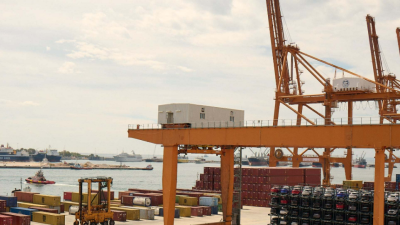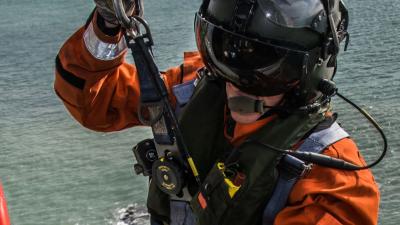
METAVASEA: supporting a people-centred transition for maritime decarbonisation
METAVASEA aims to train and upskill 1,500 seafarers, port workers, and shipping professionals in new fuels, digital and marine environmental awareness.
This page is approximately a 3 minute read
This page was published on

Search and rescue (SAR) services are needed on the world’s oceans, rivers and waterways even during a pandemic – but the act of saving lives under these circumstances can put rescuers and those they rescue in harm’s way.
Over 320,000 people worldwide drown every year so search and rescue is a vital service which carries on being needed as long as people and vessels are on the water. Keeping essential search and rescue workers safe during the COVID-19 pandemic has been a major challenge. So we are proud to have helped the International Maritime Rescue Federation (IMRF) produce its lifesaving Search and Rescue Pandemic Response Guidance Manual, which was launched in February 2021.
The IMRF is an international charity, based in the UK, which represents search and rescue (SAR) organisations around the world. It’s the only maritime SAR non-governmental organisation (NGO) in consultative status at the International Maritime Organization.
When the coronavirus crisis swept across the world, the IMRF put together a set of basic guidelines in just four weeks – and these are at the heart of the manual. Unfortunately, COVID-19 will not be the world’s last pandemic, so longer-lasting, more in-depth guidance was needed to ensure SAR organisations are prepared in the future.
Theresa Crossley, IMRF’s CEO, commented:
“We are very grateful to Lloyd’s Register Foundation for supporting the development of this important guidance and to all our members for sharing their experiences and learning so candidly. This is a demonstration of what the IMRF is all about – sharing best practice and knowledge wherever possible, to save more lives in the world’s waters.”
“All around the world, our members report that their search and rescue services are needed as much as ever. Yet operating conditions are far more challenging and SAR teams face unprecedented new risks.
“This guidance brings together all the knowledge and experience of our international membership. It began life as guidance designed specifically to meet the SAR operational challenges faced in the current global pandemic, but, with the help of Lloyd’s Register Foundation, we have been able to develop it furthered for use as a basis for operational planning and response in any future pandemics or major health emergencies.”
Dr Jan Przydatek, Lloyd’s Register Foundation’s Director of Technologies, explains why our support for production of the manual is helping keep people safe while they save lives:
“The important work of SAR services does not disappear during a pandemic, but a pandemic does create additional health protection challenges for SAR operations. The primary aim of this Pandemic Response Guidance for Maritime SAR Organisations is to support those providing maritime SAR services in extraordinary circumstances to do so safely, with minimum risk to the health of casualties and personnel alike.”
The manual tells organisations what to do – and what to stop doing – during a pandemic. The fundamentals are to restrict activities to the core work – rescue – and stop doing other things like public demonstrations to minimise infection risk.
It outlines the roles of different stakeholders and priorities for maritime SAR organisations, as well as suggesting options for the delivery of essential training and guidance for non-operational activities. Importantly, the manual also addresses the well-being of SAR personnel and measures for safeguarding the environment.
The manual is based on real experience and shared learning from IMRF member organisations and was launched online in February 2021. It includes online resources (freely available on the IMRF website) and photographs, diagrams and infographics – particularly useful in countries where English is not the first language.
Our grant is also supporting live streaming of the pandemic sessions at the IMRF’s next search and rescue conference, scheduled to take place in October 2021 in Gothenburg, Sweden.
The manual can be found here: